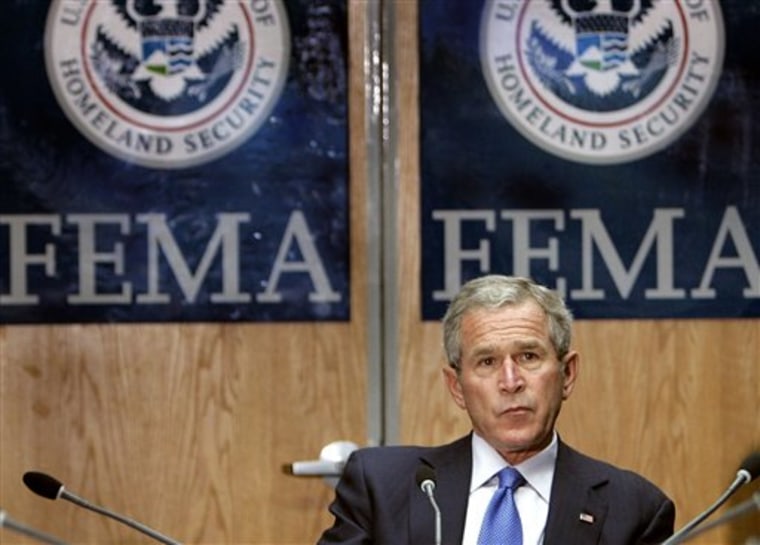If analysts agree on anything when it comes to the federal agency responsible for handling disasters, it's that it lacks the money to prepare for calamities that are not literally on the horizon. Much else about the budget of the Federal Emergency Management Agency defies consensus — or even comprehension.
Unlike most parts of the government, FEMA is different at different times, small in size and budget when nothing much is going on, swelling to huge and expensive when a disaster strikes.
That lets FEMA spend money when it also has plenty of political capital to cash in, because Americans want the government to do all it can when they see people hurting from hurricanes, floods or other disasters.
But FEMA's heavy dependence on emergencies to get the money coming in leaves it struggling to do a thorough job on preparation.
"We have the hardest time paying attention to things that haven't happened yet," said Natalie C. Simpson, an emergency management expert at the State University of New York at Buffalo.
Not enough 'proactive' funding
As a result, a lot of things don't get done, said William Lee Waugh of the Andrew Young School of Policy Studies at Georgia State University.
For example, FEMA regional offices always need students and others to do basic research and projects beyond the abilities of the agency's full-time workers, he said.
"It's a tiny agency and the base budget does not include enough funding to be proactive," Waugh said. "They certainly don't have enough funds to set priorities and address the known risks."
Congress has approved more than $62 billion in supplemental spending for the recovery and rebuilding of Gulf Coast areas devastated by Hurricane Katrina. More such spending is certain to help people recover from Katrina and the follow-up punch of Hurricane Rita.
The Katrina response alone amounted to more than 11 times FEMA's 2005 budget of $5.5 billion. That budget was higher than usual because of cleanup costs due to four major hurricanes that hit Florida last year.
FEMA has borne the brunt of criticism about the Bush administration's lagging response to Katrina. The agency's director, Michael Brown, was removed from on-site command and resigned.
Disasters can be planned for, said Peter S. Davis, a professor at the University of Memphis, "but that requires consistency in funding."
Messy transfer to Department of Homeland Security
Davis, a FEMA emergency housing manager in the late 1970s, contends FEMA's transfer into the Department of Homeland Security "led to a slow, inadequate and poorly coordinated response to a predictable event."
Tracking FEMA's numbers was relatively simple when it was an independent agency. When it became part of Homeland Security, everything became more complex.
For example, FEMA lost some activities to transportation and border security agencies and gained some from the Health and Human Services Department.
In March, Brown said the agency had spent $5.5 billion on disaster aid, including $4.8 billion for hurricane assistance, in 2004. There were 65 disaster declarations in 2004, the most for any year in a decade, he said at a hearing.
At that hearing, Rep. Martin Sabo, D-Minn., commented that FEMA had lost about 500 staff members since joining Homeland Security. He asked where the reductions had been.
Brown said they were spread over the agency, including headquarters and regional offices. The administration was recommending restoring 190 of the jobs, he said.
For 2005, about $9.4 billion was appropriated for Homeland Security's emergency preparedness and response, according to a congressional analysis. That was up from $5.4 billion in 2004 and $4.4 billion in 2003.
Budget, number of employees difficult to discern
Depending who provides the numbers and what's counted, FEMA's basic budget rose or fell over the last few years.
In FEMA's last budget year as an independent agency, 2001, it had a budget of $4.4 billion.
The Office of Management and Budget put non-emergency FEMA funding at about $2.8 billion in 2004.
OMB Watch, a private advocacy group urging government accountability, said it calculated base FEMA funding, without emergency response money, at $1 billion in 2003, $960 million in 2004 and $928 million in 2005.
OMB Watch's Adam Hughes said moving FEMA into Homeland Security forced it to compete with other department priorities, notably fighting terrorism, a higher priority of this administration.
He estimated FEMA funding other than emergency spending declined 10 percent since the agency joined Homeland Security.
Figuring out how many people work for FEMA is also harder than it might seem.
FEMA said that as of Aug. 8 it had a total work force of 20,287, up from 8,388 on Sept. 22, 2001.
Most of the increase — 9,346 — came from disaster medical assistance teams transferred from the Health and Human Services Department. FEMA's fulltime staff rose to 2,262 from 2,132.
